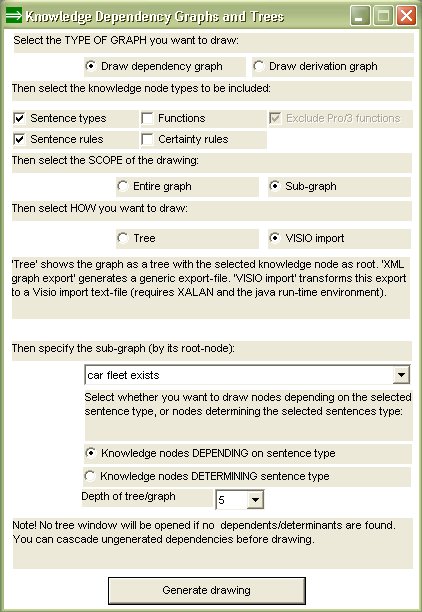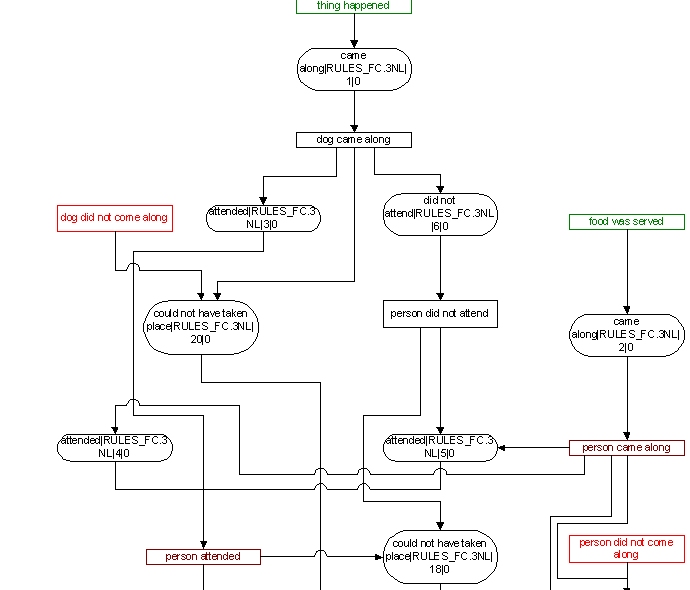| Knowledge
dependency graphs (dependency graphs and derivation graphs), can be
drawn as trees (in the Pro/3 MDI windows) or as indirectly as
directed graphs via MS Visio graph imports .
The scope and style of drawing is controlled in
the Knowledge Dependencies-window.
|
|
 |
| CONTROL |
DESCRIPTION |
| Dependency
graph vs. derivation graph |
See derivation
of sentences. |
| Knowledge
node type selection |
Only the
selected node types will be drawn. Indirect dependencies via
suppressed nodes will be drawn as direct dependencies. E.g. A--->B--->C--->D
will be drawn as A--->D if A and D are included and B
and C are suppressed. |
| Scope |
The scope
is either the entire graph or a sub-graph defined by a given
node and its dependents/determinants in a given number of
levels (depth). |
| Type
of drawing |
Pro/3 can
only draw the graph as a tree (that is directly in the
MDI window). Genuine graphs can be drawn with graphics software
such as Microsoft VISIO (use option XSL translation). |
|
|
|
|
Microsoft VISIO
drawing (graph drawing) |
To
import the text file into Microsoft VISIO:
- Select Tools
- Select Macros
- Select Flowchart
- Select Import Flowchart Data Wizard
- Press Next
- Select Read Data From Existing File
- Browse and select the generated file
(.TXT)
- Press Next
- Press Finish
- Select comma (,) as field
separator.
- Press Ok
|
|

|
|
Microsoft
VISIO drawing conventions |
| KNOWLEDGE
NODE |
SYMBOL |
COLOR |
SUB-TYPE |
TEXT |
SUFFIX |
| SENTENCE
GROUP |
DOUBLE-SIDED
RECTANGLE |
BLACK |
|
NL name |
|
| SENTENCE
TYPE |
RECTANGLE |
GREEN |
entered
sentences only |
NL name |
|
| do. |
do. |
BROWN |
mixed
entered and derived sentences with dependent knowledge |
do. |
|
| do. |
do. |
BLUE |
mixed
entered and derived sentences without dependent knowledge |
do. |
|
| do. |
do. |
BLACK |
derived
sentences with dependent knowledge |
do. |
|
| do. |
do. |
RED |
derived
sentences without dependent knowledge |
do. |
|
| SENTENCE
RULE |
ROUNDED
RECTANGLE |
BLACK |
simple
implication (incl. generalization) |
realm name
and number |
|
| do. |
do. |
BROWN |
rule
calling inexact rules |
do. |
[p] |
| do. |
do. |
RED |
statistical
rule |
do. |
[s] |
| do. |
do. |
GREEN |
value
accumulation rule |
do. |
[a] |
| do. |
do. |
BLUE |
selection,
ranking, correlation, interpolation rule |
do. |
[<]
minimum value; [>] maximum value; [u] unique; [r] ranking;
[c] correlation; [i] interpolation |
| FUNCTION |
DIAMOND |
BLUE |
deterministic
function KE defined |
NL name |
|
| do. |
do. |
RED |
non-deterministic
function KE defined |
NL name |
|
| do. |
do. |
BLACK |
deterministic
Pro/3 function |
NL name |
*
indicates built-in |
| do. |
do. |
BROWN |
non-deterministic
Pro/3 function |
NL name |
*
indicates built in |
| CERTAINTY
RULE |
HEXAGON |
RED |
data/query
rule |
|
[q] |
| do. |
do. |
BLUE |
data/question
rule |
|
[?] |
| do. |
do. |
BROWN |
switch
rule |
|
[s] |
| do. |
do. |
PINK |
map rule |
|
[m] |
| do. |
do. |
GREEN |
bayesian
rule |
|
[b] |
| do. |
do. |
BLACK |
and/or/not
rule |
|
[&] and [v] or [~] not |
|
Sentence
groups, sentence types and functions are additionally suffixed by chain
characteristics:
- !
public read-only
- !w
public read-write
- +X external
read-only from database X
- +Xw external read-write
from database X
Counts for derived and entered sentences
in the sentence types are also suffixed if selected. |
|
|
Dependency
Trees |
| The dependency tree window shows a dependency graph or a derivation graph
drawn as a tree (in the Pro/3 MDI window), for
simplicity referred to as a dependency tree. A dependency tree shows the dependencies between sentence
types, sentence rules, inexact rules and functions (knowledge nodes). The root of the tree is always a sentence
type. The branches of the tree is either knowledge nodes which determine the root or nodes which depend
on the root (recursively). Dependency trees are drawn such that derived
knowledge (dependent knowledge) is drawn to the left while determinant knowledge
is drawn to the right. |
|

|
Drawing
conventions:
- Sentence types are shown with or without sentence counts in brackets. The first count is inputted sentences
while the second count is derived sentences.
- Sentence rules are shown as KB | realm | no | sub.no.
- Certainty rules are marked with [C] (left).
- Functions are marked with [F] (left).
|
|
The File/Print command prints the tree.
The Up/Down/Left/Right commands in the Edit-menu is used to re-direct the tree.
|
|
Mouse
Operations |
| The following mouse-operations are available in
dependency tree windows: |
|
MOUSE GESTURE
|
CURRENT NODE
|
EFFECT
|
| left button single
click |
any |
highlights the
clicked node |
| left button double
click |
any
|
toggle for
opening/closing the clicked node's sub-tree |
| right button single
click (on highlighted node) |
sentence type;
sentence rule; inexact rule; function |
makes the
highlighted inexact rule current in the annotation part of the KE
Assistant window |
| right button double
click |
sentence type |
opens a table window
with all sentences of this type |
| right button double
click |
sentence rule |
opens the rule
editor with this rule |
| right button double
click |
inexact rule |
opens the
inexact
rule window with this rule |
| right button double
click |
function |
opens the
function-window with this function |
|


